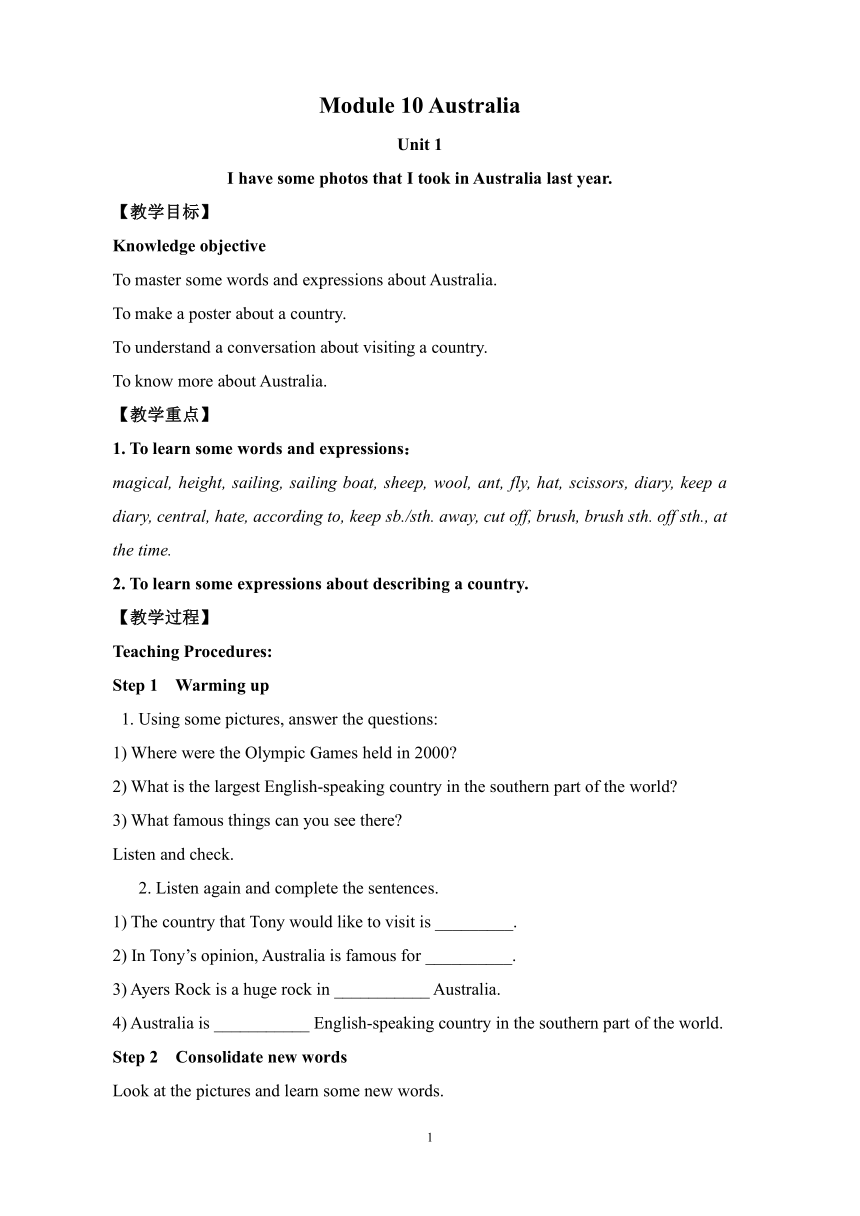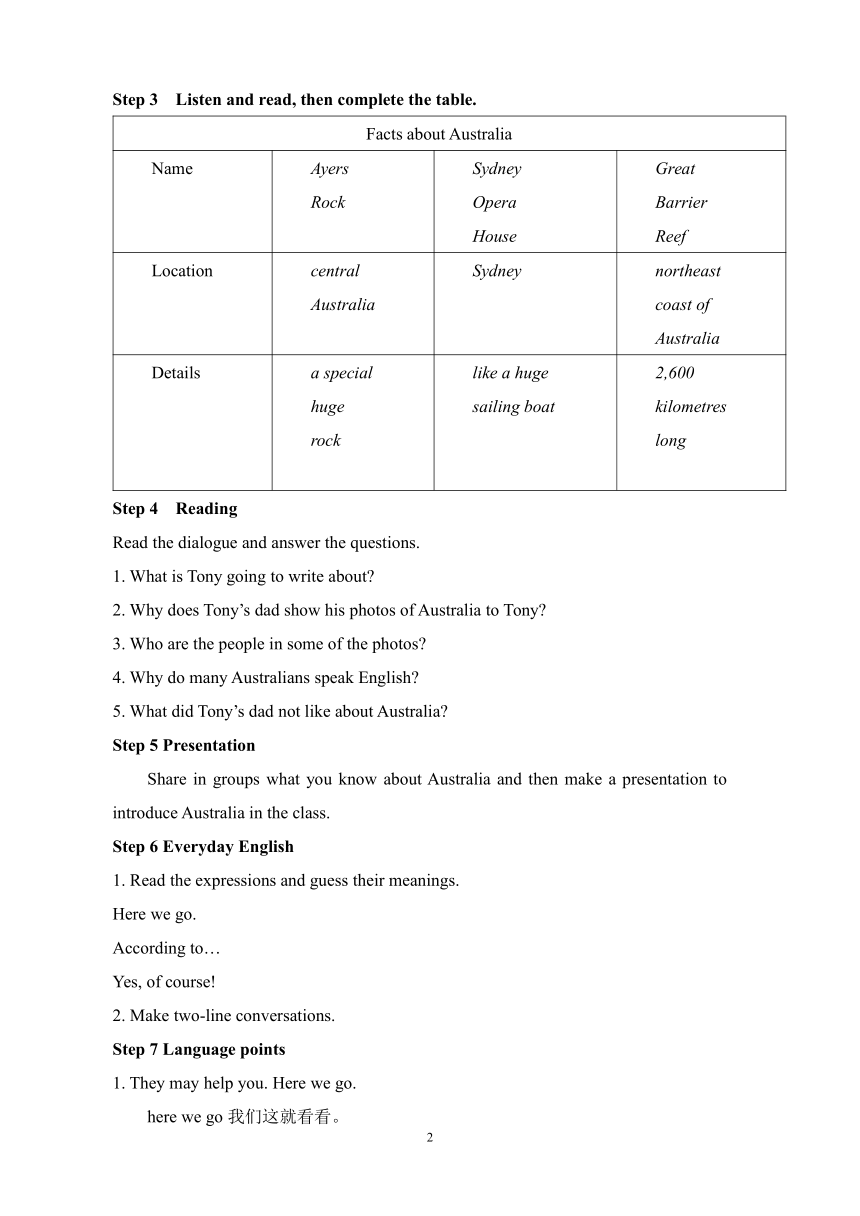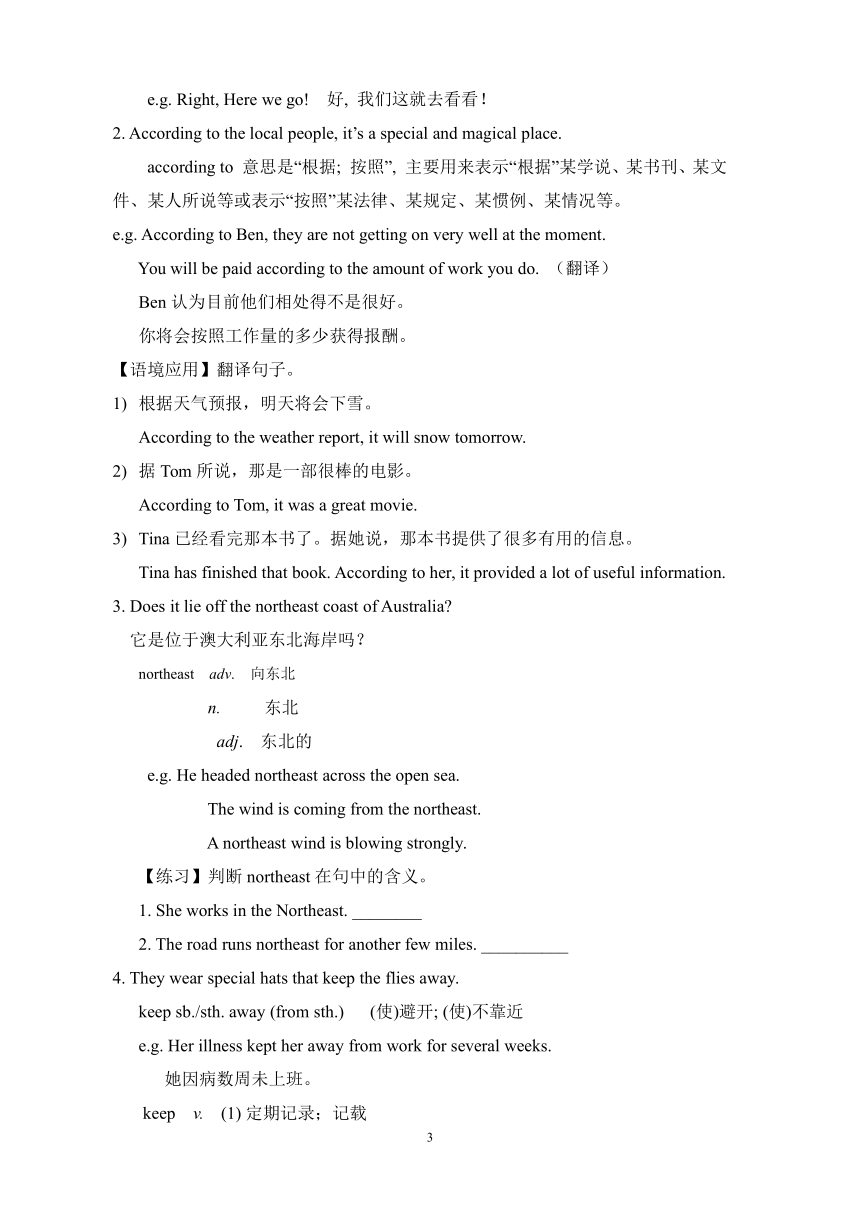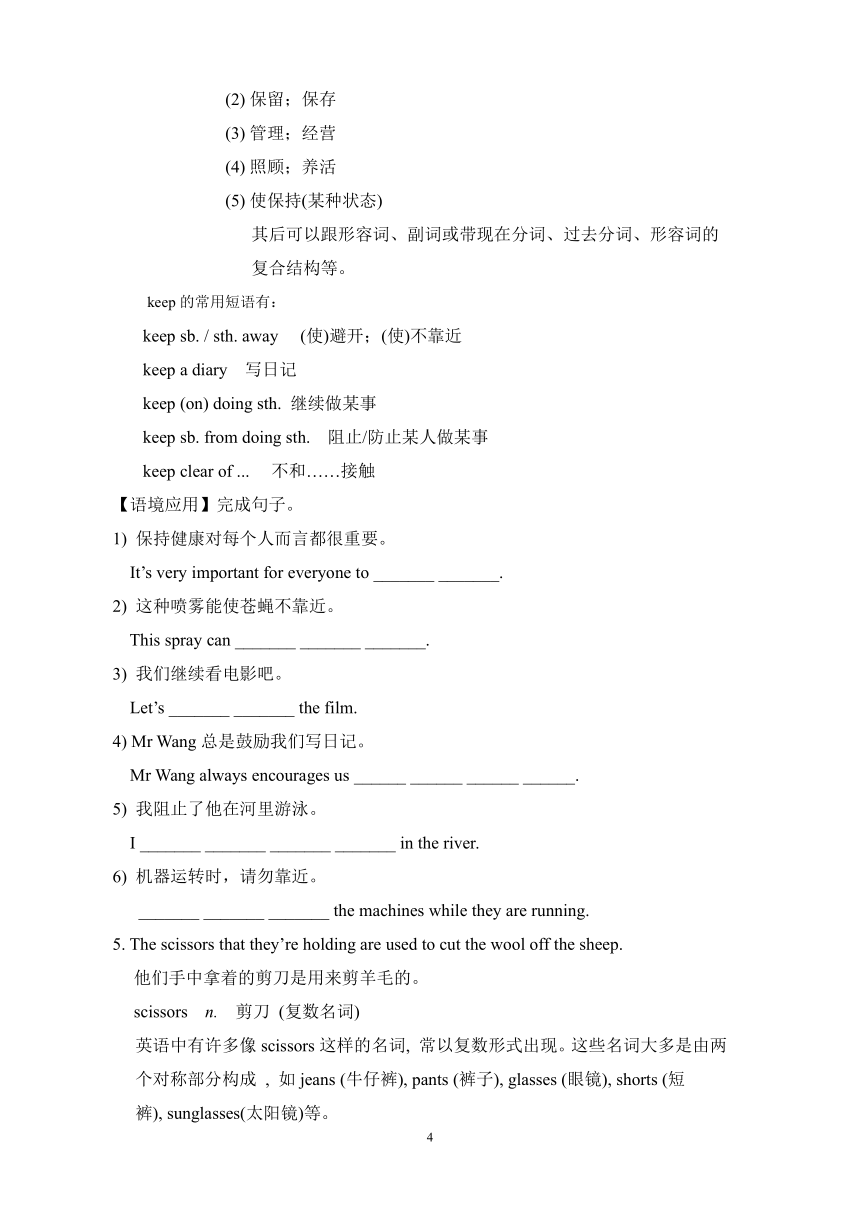Module 10 Australia Unit1教案
文档属性
| 名称 | Module 10 Australia Unit1教案 |

|
|
| 格式 | docx | ||
| 文件大小 | 31.7KB | ||
| 资源类型 | 教案 | ||
| 版本资源 | 外研版 | ||
| 科目 | 英语 | ||
| 更新时间 | 2022-09-07 00:00:00 | ||
图片预览




文档简介
Module 10 Australia
Unit 1
I have some photos that I took in Australia last year.
【教学目标】
Knowledge objective
To master some words and expressions about Australia.
To make a poster about a country.
To understand a conversation about visiting a country.
To know more about Australia.
【教学重点】
1. To learn some words and expressions:
magical, height, sailing, sailing boat, sheep, wool, ant, fly, hat, scissors, diary, keep a diary, central, hate, according to, keep sb./sth. away, cut off, brush, brush sth. off sth., at the time.
2. To learn some expressions about describing a country.
【教学过程】
Teaching Procedures:
Step 1 Warming up
1. Using some pictures, answer the questions:
1) Where were the Olympic Games held in 2000
2) What is the largest English-speaking country in the southern part of the world
3) What famous things can you see there
Listen and check.
2. Listen again and complete the sentences.
1) The country that Tony would like to visit is _________.
2) In Tony’s opinion, Australia is famous for __________.
3) Ayers Rock is a huge rock in ___________ Australia.
4) Australia is ___________ English-speaking country in the southern part of the world.
Step 2 Consolidate new words
Look at the pictures and learn some new words.
Step 3 Listen and read, then complete the table.
Facts about Australia
Name Ayers Rock Sydney Opera House Great Barrier Reef
Location central Australia Sydney northeast coast of Australia
Details a special huge rock like a huge sailing boat 2,600 kilometres long
Step 4 Reading
Read the dialogue and answer the questions.
1. What is Tony going to write about
2. Why does Tony’s dad show his photos of Australia to Tony
3. Who are the people in some of the photos
4. Why do many Australians speak English
5. What did Tony’s dad not like about Australia
Step 5 Presentation
Share in groups what you know about Australia and then make a presentation to introduce Australia in the class.
Step 6 Everyday English
1. Read the expressions and guess their meanings.
Here we go.
According to…
Yes, of course!
2. Make two-line conversations.
Step 7 Language points
1. They may help you. Here we go.
here we go我们这就看看。
e.g. Right, Here we go! 好, 我们这就去看看!
2. According to the local people, it’s a special and magical place.
according to 意思是“根据; 按照”, 主要用来表示“根据”某学说、某书刊、某文件、某人所说等或表示“按照”某法律、某规定、某惯例、某情况等。
e.g. According to Ben, they are not getting on very well at the moment.
You will be paid according to the amount of work you do. (翻译)
Ben认为目前他们相处得不是很好。
你将会按照工作量的多少获得报酬。
【语境应用】翻译句子。
根据天气预报,明天将会下雪。
According to the weather report, it will snow tomorrow.
据Tom所说,那是一部很棒的电影。
According to Tom, it was a great movie.
Tina已经看完那本书了。据她说,那本书提供了很多有用的信息。
Tina has finished that book. According to her, it provided a lot of useful information.
3. Does it lie off the northeast coast of Australia
它是位于澳大利亚东北海岸吗?
northeast adv. 向东北
n. 东北
adj. 东北的
e.g. He headed northeast across the open sea.
The wind is coming from the northeast.
A northeast wind is blowing strongly.
【练习】判断northeast在句中的含义。
1. She works in the Northeast. ________
2. The road runs northeast for another few miles. __________
4. They wear special hats that keep the flies away.
keep sb./sth. away (from sth.) (使)避开; (使)不靠近
e.g. Her illness kept her away from work for several weeks.
她因病数周未上班。
keep v. (1) 定期记录;记载
(2) 保留;保存
(3) 管理;经营
(4) 照顾;养活
(5) 使保持(某种状态)
其后可以跟形容词、副词或带现在分词、过去分词、形容词的复合结构等。
keep的常用短语有:
keep sb. / sth. away (使)避开;(使)不靠近
keep a diary 写日记
keep (on) doing sth. 继续做某事
keep sb. from doing sth. 阻止/防止某人做某事
keep clear of ... 不和……接触
【语境应用】完成句子。
1) 保持健康对每个人而言都很重要。
It’s very important for everyone to _______ _______.
2) 这种喷雾能使苍蝇不靠近。
This spray can _______ _______ _______.
3) 我们继续看电影吧。
Let’s _______ _______ the film.
4) Mr Wang总是鼓励我们写日记。
Mr Wang always encourages us ______ ______ ______ ______.
5) 我阻止了他在河里游泳。
I _______ _______ _______ _______ in the river.
6) 机器运转时,请勿靠近。
_______ _______ _______ the machines while they are running.
5. The scissors that they’re holding are used to cut the wool off the sheep.
他们手中拿着的剪刀是用来剪羊毛的。
scissors n. 剪刀 (复数名词)
英语中有许多像scissors这样的名词, 常以复数形式出现。这些名词大多是由两个对称部分构成 , 如jeans (牛仔裤), pants (裤子), glasses (眼镜), shorts (短裤), sunglasses(太阳镜)等。
这些名词作主语时,谓语动词用复数形式;
这些词还可以用 a pair of / ... pairs of修饰,表示“一/几双(对、件、副、把等)”,作主语时,谓语动词取决于pair的单复数形式。
e.g. Jeans are popular with young people now.
There is a pair of glasses on the desk. Whose is it
These two pairs of pants are too short for me now. I need to buy a new pair.
【语境应用】翻译句子。
1) 这是你的剪刀吗?
Are these your scissors
2) 盒子里有一双鞋。
There is a pair of shoes in the box.
3) 这两副眼镜很贵。
The two pairs of glasses are very expensive.
6. I hated the ants that were all over the place.
hate v. 憎恨;讨厌
(其后可以接名词、代词、动词的-ing形式、动词不定式等)
e.g. Lily hates mice / them.
Jim hated exercising when he was young.
I hate to do the laundry now.
【语境应用】完成句子。
1) David讨厌鱼肉,他从不吃它。
David _______ _______ and never eats any.
2) 这个节目如此无聊以至于我讨厌它。
This programme is so boring that I _______ _______.
3) Mr Black现在讨厌在公共场合讲话。
Mr Black _______ _______ in public now.
4) Mary是个不愿出错的人。
Mary is a person that _______ _______ _______ mistakes.
7. I had to brush them off my clothes, especially my trousers!
brush v. (用刷子)刷
n. 刷子
brush sth. off sth. 把某物从某物上刷掉
e.g. She brushed the dust off the tablecloth.
她把桌布上的灰尘拭去。
8. It wasn’t funny at the time!
at the time 那时; 在那段时间
e.g. In 1969 the first men landed on the moon — I was twelve at the time.
1969年人类第一次登上月球——那时我十二岁。
【拓展】
at times 有时; 不时
at a time 一次,每次
e.g. She visits me at times.
Enter two at a time. (翻译)
她有时来看我。
每次进来两人。
Step 8 Practice
Complete the passage with the correct form of the words and expression in the box.
Tony is going to write a letter about Australia. His dad helps him. He shows Tony some photos. Tony sees a photo of Ayers Rock in _________ Australia. Ayers Rock has a(n) _______ of 348 metres, and _____________ the local people, it is a magical place. Tony also sees some photos of some sheep farmers with special _____ to keep away flies. The farmers use ________ to cut the wool off sheep. Tony’s dad says Tony can read his ______. He also says he ________ the _________ that he had to ________ off his clothes!
Step 9 Pronunciation and speaking
Say the sentences aloud.
1. Here we go.
2. Yes, of course!
3. That’s really funny!
Now listen and repeat.
英语有两种基本语调:升调和降调。
说话人可通过语调准确地表达各种信息。
①升调多用来表示 “不肯定” 和 “未完结”, 用在一般疑问句、委婉的祈使句和打招呼的用语中。
②降调表示“肯定”和“完结”, 一般出现在陈述句、祈使句和特殊疑问句中。感叹句中多用降调表示感叹。
Step 10 Think about it
Think of a place you have visited. Make notes about the best things you have seen there.
Step 11 Work in pairs. Ask and answer questions about the place. Say:
what is called
where it is
what is special about it
-- What’s the name of the place that you have visited
-- It’s called Mount Tai.
Step 12 Summary
根据;按照;据……所说 according to
帆船 sailing boat
(使) 避开;(使)不靠近 keep sb. / sth. away
把某物从某物上剪掉 cut sth. off sth.
写日记 keep a diary
把某物从某物上刷掉 brush sth. off sth.
那时;在那段时间 at the time
Step 13 Exercise
Ⅰ. 根据语境及所给首字母提示补全所缺单词。
1. —You can go swimming with Daisy.
—Are you joking She h_______ swimming.
2. The sunshine is too strong, so you'd better wear a(n) h_______.
3. This scarf is 100% w_______. I bought it in Australia.
4. —What's the h_______ of that blue building
—About 4.5 metres.
5. —Could you please pass me the s_______ I want to cut the paper into pieces.
—Of course. Here you are.
Ⅱ. 根据语境用括号内所给单词的适当形式填空。
1. The small island is really a _______(magic) place for people to get married.
2. Mr Black keeps thousands of _______(sheep) on his farm.
3. The new park will be built in the _______(centre) part of the city.
4. —The condition of this restaurant is quite terrible.
—Yes, there are so many _______(fly) circling.
5. She recorded every important moment in her life by _______(keep) diaries.
Ⅲ. 根据括号内的要求完成下列各题,每空一词(含缩略形式)。
1. I like the teddy bear. Mike bought it for me last week. (改为由that引导的定语从句)
I like the teddy bear _______ _______ _______ for me last week.
2. Mr Wang asked us to play football after lunch. (改为否定句)
Mr Wang _______ _______ _______ _______ play football after lunch.
3. She has to hand in her homework today. (改为否定句)
She _______ _______ _______ hand in her homework today.
4. A little girl won the match. The little girl's name is Cindy. (合并为一句)
A little girl _______ Cindy won the match.
5. How tall is the building (改为同义句)
_______ _______ _______ _______ the building
6. Linda said the concert was a great success. (改为同义句)
_______ _______ Linda, the concert was a great success.
7. The house that has a red roof is my favourite. (对划线部分提问)
_______ _______ is your favourite
Ⅳ. 根据汉语意思完成英语句子,每空词数不限。
1. 这是一片特别而又神奇的土地。
It's a(n) _____________________ land.
2. 这块石头像一只动物。
This stone _____________________ an animal.
3. Mary正穿着的那条粉红色连衣裙是妈妈给她的生日礼物。
The pink dress _____________________ is a birthday present from her mum.
4. Lisa的奶奶病了,这就是她昨天没来参加晚会的原因。
Lisa's granny is ill. _____________________ she didn't come to the party yesterday.
5. 让我给你把衣服上的叶子刷下来吧。
Let me _____________________ your clothes.
6. 关于这部电影,你不喜欢什么地方?
_____________________ about this film
7. 我们不得不在天黑之前到达那个村子。
We _____________________ that village before it is dark.
答案
Ⅰ. 1. hates 2. hat 3. wool 4. height 5. scissors
Ⅱ. 1. magical 2. sheep 3. central 4. flies 5. keeping
Ⅲ. 1. that Mike bought 2. asked us not to 3. doesn't have to 4. named / called
5. What's the height of 6. According to 7. Which house
Ⅳ. 1. special and magical 2. is like
3. (that) Mary is wearing 4. That's why
5. brush the leaves off 6. What don't you like
7. have to arrive at / get to / reach
Step 13 Homework
Write a passage about a place you have visited.
3
Unit 1
I have some photos that I took in Australia last year.
【教学目标】
Knowledge objective
To master some words and expressions about Australia.
To make a poster about a country.
To understand a conversation about visiting a country.
To know more about Australia.
【教学重点】
1. To learn some words and expressions:
magical, height, sailing, sailing boat, sheep, wool, ant, fly, hat, scissors, diary, keep a diary, central, hate, according to, keep sb./sth. away, cut off, brush, brush sth. off sth., at the time.
2. To learn some expressions about describing a country.
【教学过程】
Teaching Procedures:
Step 1 Warming up
1. Using some pictures, answer the questions:
1) Where were the Olympic Games held in 2000
2) What is the largest English-speaking country in the southern part of the world
3) What famous things can you see there
Listen and check.
2. Listen again and complete the sentences.
1) The country that Tony would like to visit is _________.
2) In Tony’s opinion, Australia is famous for __________.
3) Ayers Rock is a huge rock in ___________ Australia.
4) Australia is ___________ English-speaking country in the southern part of the world.
Step 2 Consolidate new words
Look at the pictures and learn some new words.
Step 3 Listen and read, then complete the table.
Facts about Australia
Name Ayers Rock Sydney Opera House Great Barrier Reef
Location central Australia Sydney northeast coast of Australia
Details a special huge rock like a huge sailing boat 2,600 kilometres long
Step 4 Reading
Read the dialogue and answer the questions.
1. What is Tony going to write about
2. Why does Tony’s dad show his photos of Australia to Tony
3. Who are the people in some of the photos
4. Why do many Australians speak English
5. What did Tony’s dad not like about Australia
Step 5 Presentation
Share in groups what you know about Australia and then make a presentation to introduce Australia in the class.
Step 6 Everyday English
1. Read the expressions and guess their meanings.
Here we go.
According to…
Yes, of course!
2. Make two-line conversations.
Step 7 Language points
1. They may help you. Here we go.
here we go我们这就看看。
e.g. Right, Here we go! 好, 我们这就去看看!
2. According to the local people, it’s a special and magical place.
according to 意思是“根据; 按照”, 主要用来表示“根据”某学说、某书刊、某文件、某人所说等或表示“按照”某法律、某规定、某惯例、某情况等。
e.g. According to Ben, they are not getting on very well at the moment.
You will be paid according to the amount of work you do. (翻译)
Ben认为目前他们相处得不是很好。
你将会按照工作量的多少获得报酬。
【语境应用】翻译句子。
根据天气预报,明天将会下雪。
According to the weather report, it will snow tomorrow.
据Tom所说,那是一部很棒的电影。
According to Tom, it was a great movie.
Tina已经看完那本书了。据她说,那本书提供了很多有用的信息。
Tina has finished that book. According to her, it provided a lot of useful information.
3. Does it lie off the northeast coast of Australia
它是位于澳大利亚东北海岸吗?
northeast adv. 向东北
n. 东北
adj. 东北的
e.g. He headed northeast across the open sea.
The wind is coming from the northeast.
A northeast wind is blowing strongly.
【练习】判断northeast在句中的含义。
1. She works in the Northeast. ________
2. The road runs northeast for another few miles. __________
4. They wear special hats that keep the flies away.
keep sb./sth. away (from sth.) (使)避开; (使)不靠近
e.g. Her illness kept her away from work for several weeks.
她因病数周未上班。
keep v. (1) 定期记录;记载
(2) 保留;保存
(3) 管理;经营
(4) 照顾;养活
(5) 使保持(某种状态)
其后可以跟形容词、副词或带现在分词、过去分词、形容词的复合结构等。
keep的常用短语有:
keep sb. / sth. away (使)避开;(使)不靠近
keep a diary 写日记
keep (on) doing sth. 继续做某事
keep sb. from doing sth. 阻止/防止某人做某事
keep clear of ... 不和……接触
【语境应用】完成句子。
1) 保持健康对每个人而言都很重要。
It’s very important for everyone to _______ _______.
2) 这种喷雾能使苍蝇不靠近。
This spray can _______ _______ _______.
3) 我们继续看电影吧。
Let’s _______ _______ the film.
4) Mr Wang总是鼓励我们写日记。
Mr Wang always encourages us ______ ______ ______ ______.
5) 我阻止了他在河里游泳。
I _______ _______ _______ _______ in the river.
6) 机器运转时,请勿靠近。
_______ _______ _______ the machines while they are running.
5. The scissors that they’re holding are used to cut the wool off the sheep.
他们手中拿着的剪刀是用来剪羊毛的。
scissors n. 剪刀 (复数名词)
英语中有许多像scissors这样的名词, 常以复数形式出现。这些名词大多是由两个对称部分构成 , 如jeans (牛仔裤), pants (裤子), glasses (眼镜), shorts (短裤), sunglasses(太阳镜)等。
这些名词作主语时,谓语动词用复数形式;
这些词还可以用 a pair of / ... pairs of修饰,表示“一/几双(对、件、副、把等)”,作主语时,谓语动词取决于pair的单复数形式。
e.g. Jeans are popular with young people now.
There is a pair of glasses on the desk. Whose is it
These two pairs of pants are too short for me now. I need to buy a new pair.
【语境应用】翻译句子。
1) 这是你的剪刀吗?
Are these your scissors
2) 盒子里有一双鞋。
There is a pair of shoes in the box.
3) 这两副眼镜很贵。
The two pairs of glasses are very expensive.
6. I hated the ants that were all over the place.
hate v. 憎恨;讨厌
(其后可以接名词、代词、动词的-ing形式、动词不定式等)
e.g. Lily hates mice / them.
Jim hated exercising when he was young.
I hate to do the laundry now.
【语境应用】完成句子。
1) David讨厌鱼肉,他从不吃它。
David _______ _______ and never eats any.
2) 这个节目如此无聊以至于我讨厌它。
This programme is so boring that I _______ _______.
3) Mr Black现在讨厌在公共场合讲话。
Mr Black _______ _______ in public now.
4) Mary是个不愿出错的人。
Mary is a person that _______ _______ _______ mistakes.
7. I had to brush them off my clothes, especially my trousers!
brush v. (用刷子)刷
n. 刷子
brush sth. off sth. 把某物从某物上刷掉
e.g. She brushed the dust off the tablecloth.
她把桌布上的灰尘拭去。
8. It wasn’t funny at the time!
at the time 那时; 在那段时间
e.g. In 1969 the first men landed on the moon — I was twelve at the time.
1969年人类第一次登上月球——那时我十二岁。
【拓展】
at times 有时; 不时
at a time 一次,每次
e.g. She visits me at times.
Enter two at a time. (翻译)
她有时来看我。
每次进来两人。
Step 8 Practice
Complete the passage with the correct form of the words and expression in the box.
Tony is going to write a letter about Australia. His dad helps him. He shows Tony some photos. Tony sees a photo of Ayers Rock in _________ Australia. Ayers Rock has a(n) _______ of 348 metres, and _____________ the local people, it is a magical place. Tony also sees some photos of some sheep farmers with special _____ to keep away flies. The farmers use ________ to cut the wool off sheep. Tony’s dad says Tony can read his ______. He also says he ________ the _________ that he had to ________ off his clothes!
Step 9 Pronunciation and speaking
Say the sentences aloud.
1. Here we go.
2. Yes, of course!
3. That’s really funny!
Now listen and repeat.
英语有两种基本语调:升调和降调。
说话人可通过语调准确地表达各种信息。
①升调多用来表示 “不肯定” 和 “未完结”, 用在一般疑问句、委婉的祈使句和打招呼的用语中。
②降调表示“肯定”和“完结”, 一般出现在陈述句、祈使句和特殊疑问句中。感叹句中多用降调表示感叹。
Step 10 Think about it
Think of a place you have visited. Make notes about the best things you have seen there.
Step 11 Work in pairs. Ask and answer questions about the place. Say:
what is called
where it is
what is special about it
-- What’s the name of the place that you have visited
-- It’s called Mount Tai.
Step 12 Summary
根据;按照;据……所说 according to
帆船 sailing boat
(使) 避开;(使)不靠近 keep sb. / sth. away
把某物从某物上剪掉 cut sth. off sth.
写日记 keep a diary
把某物从某物上刷掉 brush sth. off sth.
那时;在那段时间 at the time
Step 13 Exercise
Ⅰ. 根据语境及所给首字母提示补全所缺单词。
1. —You can go swimming with Daisy.
—Are you joking She h_______ swimming.
2. The sunshine is too strong, so you'd better wear a(n) h_______.
3. This scarf is 100% w_______. I bought it in Australia.
4. —What's the h_______ of that blue building
—About 4.5 metres.
5. —Could you please pass me the s_______ I want to cut the paper into pieces.
—Of course. Here you are.
Ⅱ. 根据语境用括号内所给单词的适当形式填空。
1. The small island is really a _______(magic) place for people to get married.
2. Mr Black keeps thousands of _______(sheep) on his farm.
3. The new park will be built in the _______(centre) part of the city.
4. —The condition of this restaurant is quite terrible.
—Yes, there are so many _______(fly) circling.
5. She recorded every important moment in her life by _______(keep) diaries.
Ⅲ. 根据括号内的要求完成下列各题,每空一词(含缩略形式)。
1. I like the teddy bear. Mike bought it for me last week. (改为由that引导的定语从句)
I like the teddy bear _______ _______ _______ for me last week.
2. Mr Wang asked us to play football after lunch. (改为否定句)
Mr Wang _______ _______ _______ _______ play football after lunch.
3. She has to hand in her homework today. (改为否定句)
She _______ _______ _______ hand in her homework today.
4. A little girl won the match. The little girl's name is Cindy. (合并为一句)
A little girl _______ Cindy won the match.
5. How tall is the building (改为同义句)
_______ _______ _______ _______ the building
6. Linda said the concert was a great success. (改为同义句)
_______ _______ Linda, the concert was a great success.
7. The house that has a red roof is my favourite. (对划线部分提问)
_______ _______ is your favourite
Ⅳ. 根据汉语意思完成英语句子,每空词数不限。
1. 这是一片特别而又神奇的土地。
It's a(n) _____________________ land.
2. 这块石头像一只动物。
This stone _____________________ an animal.
3. Mary正穿着的那条粉红色连衣裙是妈妈给她的生日礼物。
The pink dress _____________________ is a birthday present from her mum.
4. Lisa的奶奶病了,这就是她昨天没来参加晚会的原因。
Lisa's granny is ill. _____________________ she didn't come to the party yesterday.
5. 让我给你把衣服上的叶子刷下来吧。
Let me _____________________ your clothes.
6. 关于这部电影,你不喜欢什么地方?
_____________________ about this film
7. 我们不得不在天黑之前到达那个村子。
We _____________________ that village before it is dark.
答案
Ⅰ. 1. hates 2. hat 3. wool 4. height 5. scissors
Ⅱ. 1. magical 2. sheep 3. central 4. flies 5. keeping
Ⅲ. 1. that Mike bought 2. asked us not to 3. doesn't have to 4. named / called
5. What's the height of 6. According to 7. Which house
Ⅳ. 1. special and magical 2. is like
3. (that) Mary is wearing 4. That's why
5. brush the leaves off 6. What don't you like
7. have to arrive at / get to / reach
Step 13 Homework
Write a passage about a place you have visited.
3
同课章节目录
- Module 1 Wonders of the world
- Unit 1 It's more than 2,000 years old.
- Unit 2 The Grand Canyon was not just big.
- Unit 3 Language in use
- Module 2 Public holidays
- Unit 1 My family always go somewhere interesting a
- Unit 2 We have celebrated the festival since the f
- Unit 3 Language in use
- Module 3 Heroes
- Unit 1 She trained hard,so she became a great play
- Unit 2There were few doctors, so he had to work ve
- Unit 3 Language in use
- Module 4 Home alone
- Unit 1 I can look after myself, although it won’t
- Unit 2 I became so bored with their orders that I
- Unit 3 Language in use
- Module 5 Museums
- Unit 1 Don't cross that rope!
- Unit 2 If you ever go to London, make sure you vis
- Unit 3 Language in use
- Module 6 Problems
- Unit 1 If I start after dinner, I'll finish it be
- Unit 2 If you tell him the truth now, you will sho
- Unit 3 Language in use
- Revision Module A
- Module 7 Great books
- Unit 1 We're still influenced by Confucius's idea
- Unit 2 It is still read and loved.
- Unit 3 Language in use
- Module 8 Sports life
- Unit 1 Daming wasn't chosen for the team last time
- Unit 2 He was invited to competitions around the w
- Unit 3 Language in use
- Module 9 Great inventions
- Unit 1 Will computers be used more than books in t
- Unit 2 Will books be replaced by the Internet?
- Unit 3 Language in use
- Module 10 Australia
- Unit 1 I have some photos that I took in Australia
- Unit 2 The game that they like most is Australian
- Unit 3 Language in use
- Module 11 Photos
- Unit 1 He's the boy who won the photo competition
- Unit 2 The photo which we liked best was taken by
- Unit 3 Language in use
- Module 12 Save our world
- Unit 1 If everyone starts to do something, the wor
- Unit 2 Repeat these three words daily: reduce, reu
- Unit 3 Language in use
- Revision Module B
